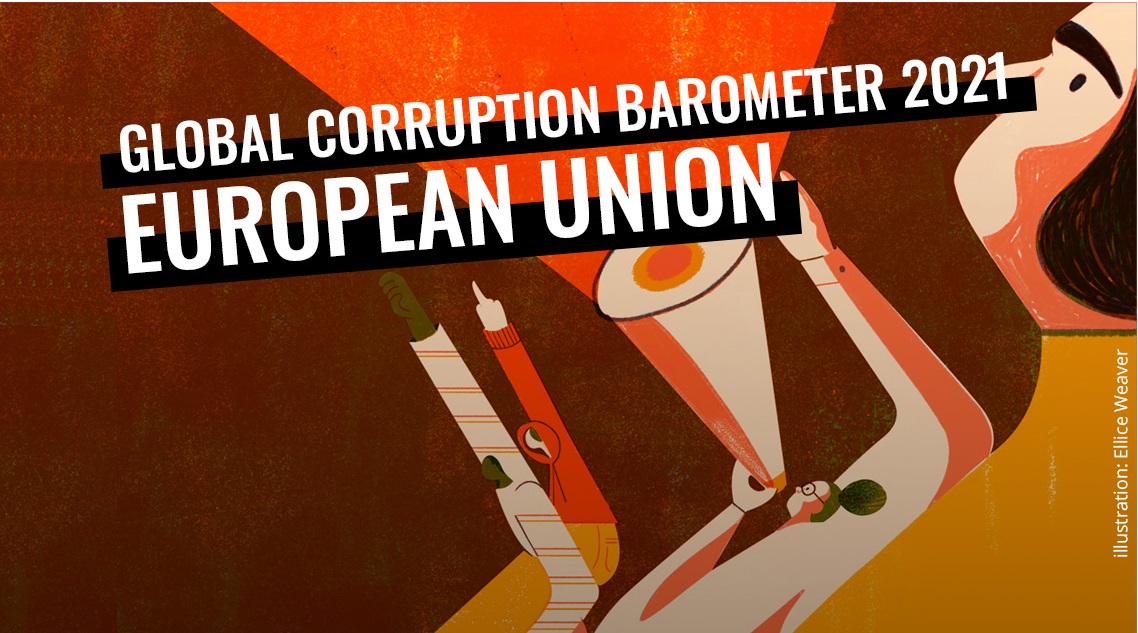- Survey results suggest undue influence over public policy is a problem but Irish public less exposed to corruption than European counterparts.
- Public confidence relatively high in level of government transparency surrounding response to Covid-19 pandemic.
Dublin, 15 June 2021*
The Global Corruption Barometer (GCB) – European Union released by Transparency International (TI) today finds mixed views among Irish people on levels of corruption and transparency over the past year. The GCB, which surveyed more than 40,000 people in the bloc, 1,000 of whom were respondents in Ireland, asked about people’s views and experiences of corruption.
Some 5% of Irish respondents said that they had paid a bribe over the past year. This is in contrast to an average 7% of respondents across the EU that said they had paid a bribe. The highest rates are in Romania (20 per cent) and Bulgaria (19 per cent), followed by Hungary (17 per cent). In addition, only 23% said that corruption had increased over the previous year (in contrast to an average of 32% elsewhere in the EU). Sextortion – the demand for sexual favours in return for essential services was perceived to be an issue across the EU, with 68% of Irish respondents saying that it was likely to be a problem and 4% saying that they had been victims of this crime over the past five years.
‘The Global Corruption Barometer results suggest that corruption might be a bigger issue for most of our EU neighbours than in Ireland but shows that we can’t be complacent. This is particularly so when a sizeable percentage of the Irish public believe that corruption and illicit influence are still affecting some key government functions, such as public procurement’, said John Devitt, Chief Executive of TI Ireland.
Despite the low level of reported corruption in Ireland, the majority of those polled (63%) said they believed that corruption was likely to be a factor in the award of valuable public contracts, while 28% of respondents (EU average 33%) said that they had used personal connections to solve a problem with public servants and 14% (EU average of 21%) claiming that they had used personal connections to avoid a problem like passing a checkpoint or avoiding a fine or arrest. Some 40% of Irish respondents also said that they believed the government is ‘pretty much run by a few big interests looking out for themselves’.
‘The Government has made some welcome progress in legislating for new corruption offences and is now developing its first anti-corruption strategy, but there’s a lot more to be done. The Public Sector Standards Bill, which would have significantly strengthened safeguards against corruption and implemented many of the Mahon Tribunal’s recommendations was allowed lapse last year, and no convincing reason has been given for the refusal to restore it. The Government has instead committed to revised ethics legislation without saying what this will involve. Transparency International, the European Commission and others have also made numerous recommendations that would address corruption risks and help build public confidence in the rule of law: many of these proposals could be implemented without undue cost or delay’, Mr Devitt added.
The GCB has also pointed to a continuing lack of confidence in the State’s ability to hold corrupt officials to account, and a significant proportion of Irish people (42%) said that they believed that the authorities ‘rarely or never’ take appropriate action against officials who engage in corruption. Nonetheless, the GCB results for Ireland suggest that corruption is less of an issue than elsewhere in the EU. Only 9% believe it is acceptable for the government to engage in a bit of corruption as long as it gets things done and delivers good results. In addition, 35% of respondents said they believe corruption is either a quite big (24%) or very big (11%) problem, compared to a combined EU average of 62% of respondents who said corruption was a big problem in their country.
One in three (33%) of Irish respondents (compared to an EU average of 45%) said that they would fear reprisal for speaking up about corruption. Confidence in fighting corruption was also high among Irish respondents, with 80% saying that the public can make a difference in addressing the problem, in comparison to an average of 64% of EU citizens.
Public confidence surrounding the Irish Government’s response to the Covid-19 pandemic was also relatively high, with 66% of respondents saying that they were satisfied with levels of transparency surrounding the response, compared to 44% elsewhere in the EU. Trust in national government was also reported to be relatively high with 67% (versus an average of 47% of EU citizens) saying that they either had a ‘fair amount’ or ‘great deal’ of trust in Irish politicians, public servants or any kind of government agency.
Notes to editors
- The GCB is one of the largest, most detailed surveys of people’s views on corruption and experiences of bribery in the 27 EU countries. The GCB surveyed over 40,000 people in the EU from October to December 2020. For details on the survey approach, please see the methodology note in the report.
- Detailed recommendations are available in the report, as is a country-by-country breakdown of the findings from each EU Member State.
- The Irish findings of the Global Corruption Barometer – European Union will be discussed in an online event taking place on Thursday, 17 June at 10am .
- More information on the results of the Barometer is available by request.
*Press release amended on the 15th of June to correct an error in an earlier version which stated that 4% of Irish Respondents had paid a bribe over the previous year. This should have read 5% of Irish Respondents who said they had paid a bribe over the previous year.

